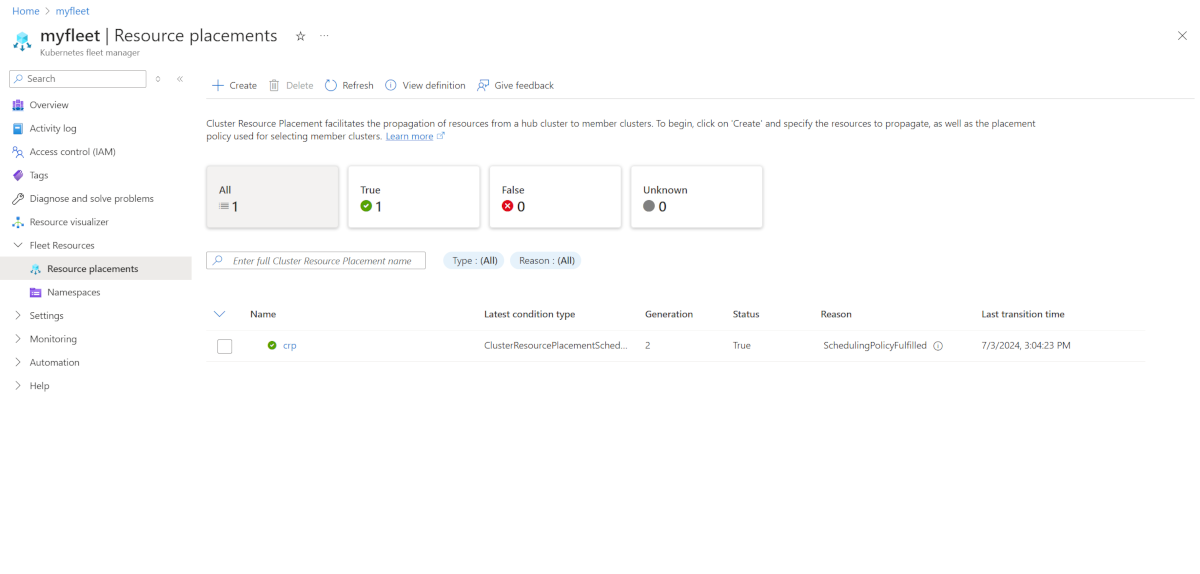Note
Access to this page requires authorization. You can try signing in or changing directories.
Access to this page requires authorization. You can try changing directories.
This article provides an overview of how to use the ClusterResourceOverride API to customize cluster-scoped resources in Azure Kubernetes Fleet Manager.
You can modify or override specific attributes across cluster resources. With ClusterResourceOverride, you can define rules based on cluster labels and specify changes to be applied to various cluster-wide resources. These resources include namespaces, cluster roles, cluster role bindings, or custom resource definitions.
These modifications might include updates to permissions, configurations, or other parameters. Such updates help ensure consistent management and enforcement of configurations across your clusters managed through Fleet Manager.
API components
The ClusterResourceOverride API consists of the following components:
clusterResourceSelectors: Specifies the set of cluster resources selected for overriding.policy: Specifies the set of rules to apply to the selected cluster resources.
Cluster resource selectors
A ClusterResourceOverride object can include one or more cluster resource selectors to specify which resources to override. The ClusterResourceSelector object supports the following fields.
Note
If you select a namespace in ClusterResourceSelector, the override will apply to all resources in the namespace.
group: The API group of the resource.version: The API version of the resource.kind: The kind of the resource.name: The name of the resource.
To add a cluster resource selector to a ClusterResourceOverride object, use the clusterResourceSelectors field with the following YAML format:
apiVersion: placement.kubernetes-fleet.io/v1alpha1
kind: ClusterResourceOverride
metadata:
name: example-cro
spec:
clusterResourceSelectors:
- group: rbac.authorization.k8s.io
kind: ClusterRole
version: v1
name: secret-reader
This example selects a ClusterRole object named secret-reader from the rbac.authorization.k8s.io/v1 API group for overriding:
apiVersion: rbac.authorization.k8s.io/v1
kind: ClusterRole
metadata:
name: secret-reader
rules:
- apiGroups: [""]
resources: ["secrets"]
verbs: ["get", "watch", "list"]
Policy
A Policy object consists of a set of rules, overrideRules, that specify the changes to apply to the selected cluster resources. Each overrideRules object supports the following fields:
clusterSelector: Specifies the set of clusters to which the override rule applies.jsonPatchOverrides: Specifies the changes to apply to the selected resources.
To add an override rule to a ClusterResourceOverride object, use the policy field with the following YAML format:
apiVersion: placement.kubernetes-fleet.io/v1alpha1
kind: ClusterResourceOverride
metadata:
name: example-cro
spec:
clusterResourceSelectors:
- group: rbac.authorization.k8s.io
kind: ClusterRole
version: v1
name: secret-reader
policy:
overrideRules:
- clusterSelector:
clusterSelectorTerms:
- labelSelector:
matchLabels:
env: prod
jsonPatchOverrides:
- op: remove
path: /rules/0/verbs/2
This example removes the verb "list" in the ClusterRole object named secret-reader on clusters with the label env: prod.
Cluster selector
You can use the clusterSelector field in the overrideRules object to specify the clusters to which the override rule applies. The ClusterSelector object supports the following field:
clusterSelectorTerms: A list of terms that specify the criteria for selecting clusters. Each term includes alabelSelectorfield that defines a set of labels to match.
Important
Only labelSelector is supported in the clusterSelectorTerms field.
JSON patch overrides
You can use jsonPatchOverrides in the overrideRules object to specify the changes to apply to the selected resources. The JsonPatch object supports the following fields:
op: The operation to perform. Supported operations include:add: Adds a new value to the specified path.remove: Removes the value at the specified path.replace: Replaces the value at the specified path.
path: The path to the field to modify. Guidance on specifying paths includes:- Must start with a slash (
/) character. - Can't be empty or contain an empty string.
- Can't be a
TypeMetafield (/kindor/apiVersion). - Can't be a
Metadatafield (/metadata/nameor/metadata/namespace), except the fields/metadata/labelsand/metadata/annotations. - Can't be any field in the status of the resource.
Examples of valid paths include:
/metadata/labels/new-label/metadata/annotations/new-annotation/spec/template/spec/containers/0/resources/limits/cpu/spec/template/spec/containers/0/resources/requests/memory
- Must start with a slash (
value: The value to add, remove, or replace. Ifopisremove, you can't specifyvalue.
The jsonPatchOverrides fields apply a JSON patch on the selected resources by following RFC 6902.
Multiple override patches
You can add multiple jsonPatchOverrides fields to an overrideRules object to apply multiple changes to the selected cluster resources. Here's an example:
apiVersion: placement.kubernetes-fleet.io/v1alpha1
kind: ClusterResourceOverride
metadata:
name: cro-1
spec:
clusterResourceSelectors:
- group: rbac.authorization.k8s.io
kind: ClusterRole
version: v1
name: secret-reader
policy:
overrideRules:
- clusterSelector:
clusterSelectorTerms:
- labelSelector:
matchLabels:
env: prod
jsonPatchOverrides:
- op: remove
path: /rules/0/verbs/2
- op: remove
path: /rules/0/verbs/1
This example removes the verbs "list" and "watch" in the ClusterRole object named secret-reader on clusters with the label env: prod:
apiVersion: rbac.authorization.k8s.io/v1
kind: ClusterRole
metadata:
name: secret-reader
rules:
- apiGroups: [""]
resources: ["secrets"]
verbs: ["get", "watch", "list"]
Apply the cluster resource placement
Create a
ClusterResourcePlacementresource to specify the placement rules for distributing the cluster resource overrides across the cluster infrastructure. The following code is an example. Be sure to select the appropriate resource.apiVersion: placement.kubernetes-fleet.io/v1 kind: ClusterResourcePlacement metadata: name: crp spec: resourceSelectors: - group: rbac.authorization.k8s.io kind: ClusterRole version: v1 name: secret-reader policy: placementType: PickAll affinity: clusterAffinity: requiredDuringSchedulingIgnoredDuringExecution: clusterSelectorTerms: - labelSelector: matchLabels: env: prodThis example distributes resources across all clusters labeled with
env: prod. As the changes are implemented, the correspondingClusterResourceOverrideconfigurations are applied to the designated clusters. The selection of a matching cluster role resource,secret-reader, triggers the application of the configurations to the clusters.Apply the
ClusterResourcePlacementresource by using thekubectl applycommand:kubectl apply -f cluster-resource-placement.yamlVerify that the
ClusterResourceOverrideobject was applied to the selected resources by checking the status of theClusterResourcePlacementresource via thekubectl describecommand:kubectl describe clusterresourceplacement crpYour output should resemble the following example:
Status: Conditions: ... Last Transition Time: 2024-04-27T04:18:00Z Message: The selected resources are successfully overridden in the 10 clusters Observed Generation: 1 Reason: OverriddenSucceeded Status: True Type: ClusterResourcePlacementOverridden ... Observed Resource Index: 0 Placement Statuses: Applicable Cluster Resource Overrides: example-cro-0 Cluster Name: member-50 Conditions: ... Message: Successfully applied the override rules on the resources Observed Generation: 1 Reason: OverriddenSucceeded Status: True Type: Overridden ...The
ClusterResourcePlacementOverriddencondition indicates whether the resource override was successfully applied to the selected resources in the clusters. Each cluster maintains its ownApplicable Cluster Resource Overrideslist. This list contains the snapshot of the cluster resource override, if relevant. Individual status messages for each cluster indicate whether the override rules were successfully applied.
Related content
Azure Kubernetes Service


